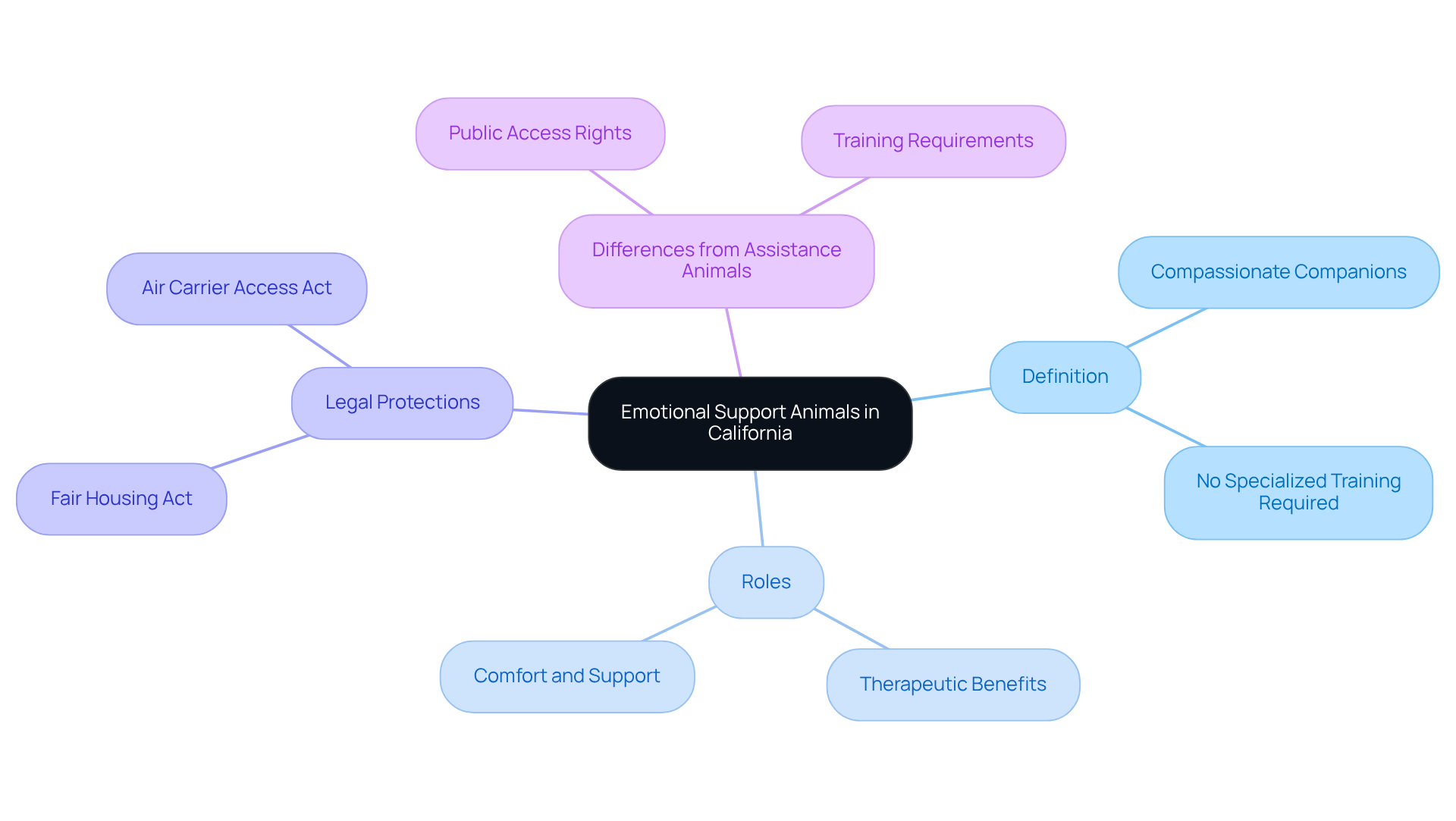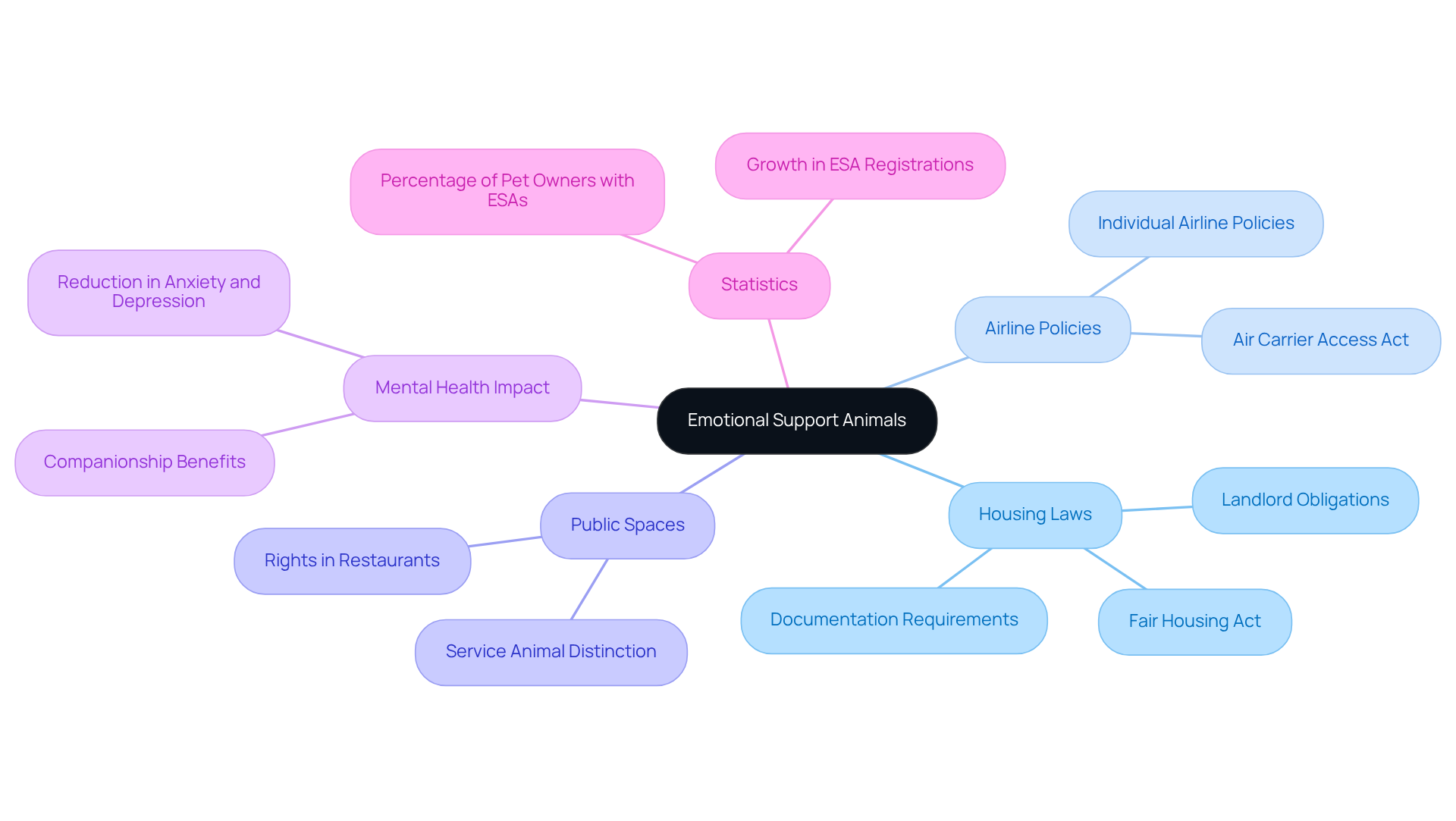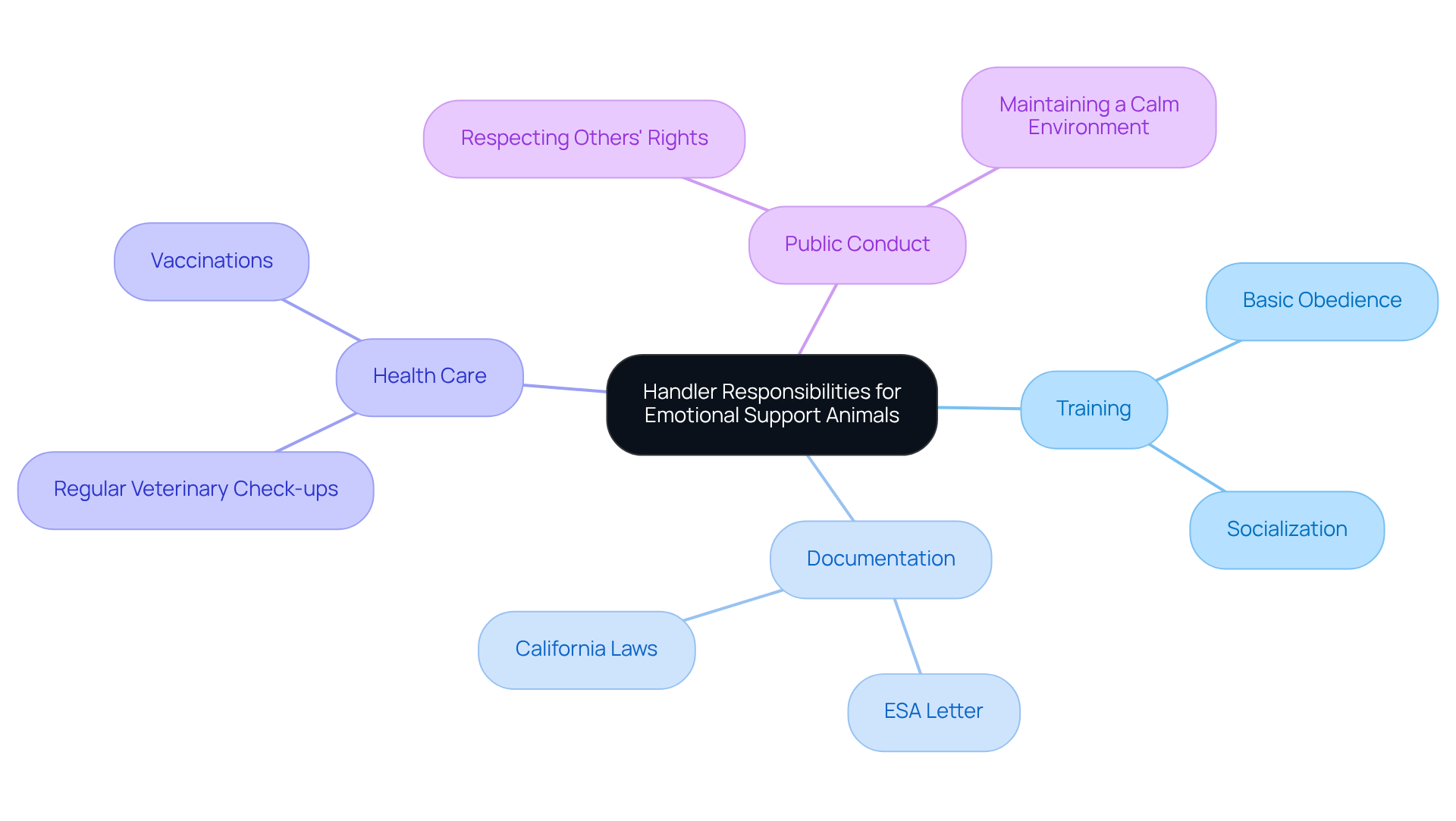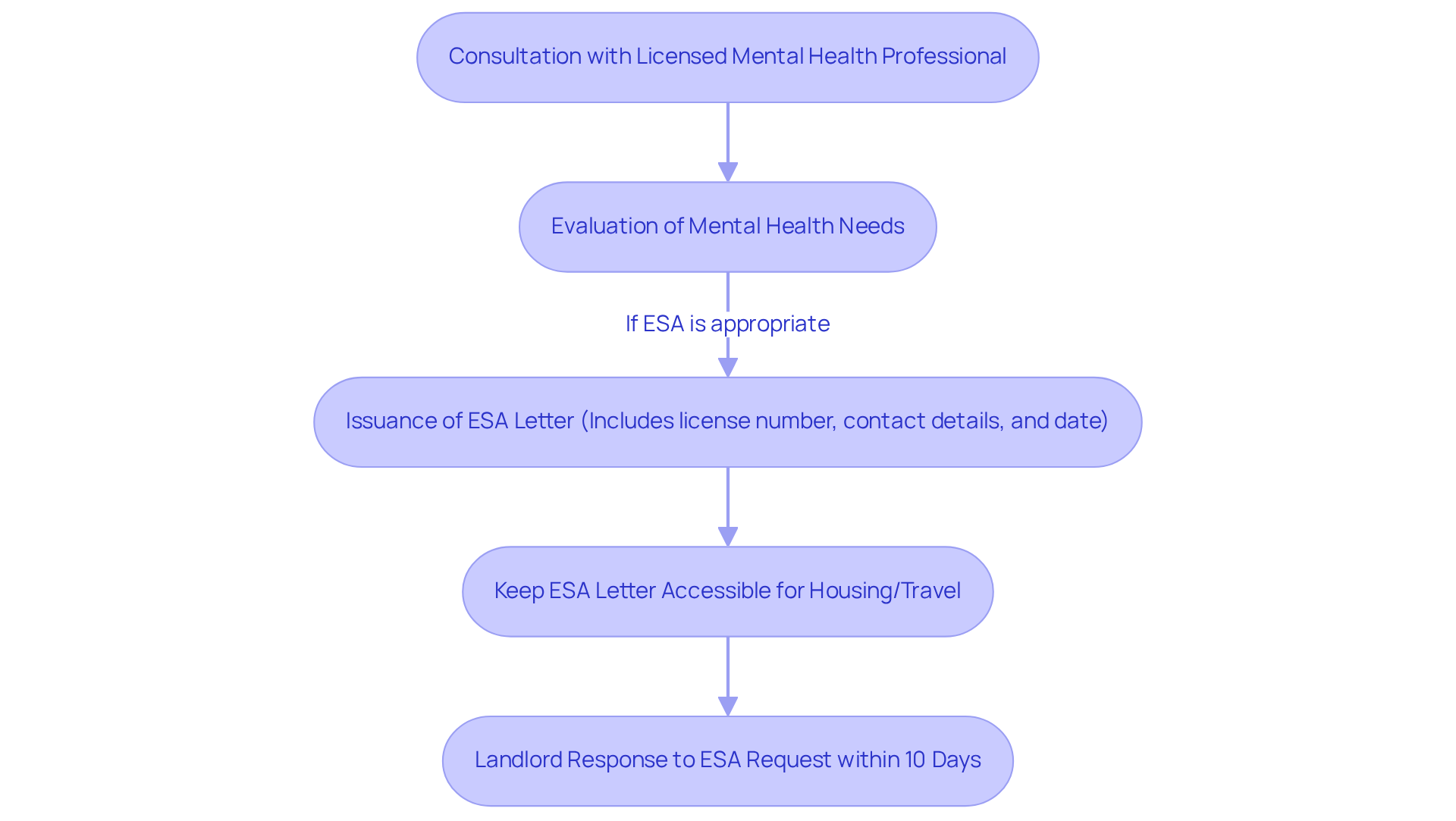

Navigate California Emotional Support Animal Laws 2024 Effectively
by Lena Park
Last updated: August 3, 2025
Verified and Approved by:
Angela Morris,
MSW, LCSW
Fact Checked

Overview
This article highlights the journey of navigating California’s Emotional Support Animal (ESA) laws in 2024, focusing on the legal protections and responsibilities that come with having an ESA. It compassionately addresses the emotional challenges faced by individuals dealing with mental health issues, recognizing the weight of these struggles.
The article outlines essential definitions, the rights granted under the Fair Housing Act and the Air Carrier Access Act, and the steps to obtain a valid ESA letter. It emphasizes the profound importance of these animals in providing emotional support, offering a beacon of hope for those in need.
By understanding the legal framework and the supportive role of ESAs, individuals can find solace in knowing that help is available, fostering a sense of connection and reassurance.
Introduction
Navigating the legal landscape surrounding Emotional Support Animals (ESAs) in California is essential for individuals seeking comfort and companionship during difficult times.
As awareness of mental health needs increases, so does the importance of understanding the evolving California emotional support animal laws in 2024.
This article explores the vital rights and responsibilities associated with ESAs, offering valuable insights on:
- How to secure an ESA letter effectively
- The locations where these animals are permitted
- The obligations that handlers must uphold
How can individuals ensure they are fully informed and compliant with these regulations while maximizing the emotional support their animals provide? Together, we can address these challenges and find the support you need.
Define Emotional Support Animals Under California Law
In California, an Emotional Support Creature serves as a compassionate companion, offering therapeutic benefits to individuals grappling with emotional or psychological conditions. Unlike assistance beings, which undergo specific training to assist those with disabilities, emotional support creatures do not require specialized training. Their primary role is to provide comfort and support simply through their presence.
Under California emotional support animal laws 2024, emotional support animals are recognized as a form of aid for individuals facing mental health challenges, including anxiety, depression, or PTSD. It’s essential to understand that while emotional support animals do not enjoy the same public access rights as service animals, they are protected under the Fair Housing Act and the Air Carrier Access Act in accordance with the California emotional support animal laws 2024. This allows individuals to live and travel with their emotional support animals in certain situations, ensuring that they can find comfort and companionship in their journey toward healing.

Identify Where Emotional Support Animals Are Allowed
Emotional Support Animals (ESAs) are important under California emotional support animal laws 2024, especially in housing situations where no-pet policies may seem restrictive. The Fair Housing Act ensures that landlords comply with California emotional support animal laws 2024 by offering reasonable accommodations for tenants with emotional support animals, as long as they present valid documentation. This legal framework, under California emotional support animal laws 2024, is crucial for those facing mental health challenges, allowing them to live alongside their emotional support animals, which can enhance their well-being and help reduce housing discrimination.
Furthermore, under the Air Carrier Access Act, airlines are required to accommodate passengers traveling with emotional support animals. However, it’s important for travelers to check individual airline policies, as rules regarding emotional support animals can differ widely. Unlike service animals, emotional support animals do not possess the same legal rights in public spaces like restaurants and shops, where businesses are not obligated to allow them. Therefore, it is wise to inquire about specific policies before planning a visit to these venues.
Significantly, around 18% of pet owners in the U.S. have emotional support animals, highlighting their growing importance in providing emotional assistance. As Jonalyn Dionio poignantly states, ‘Emotional Support Animals provide assistance to individuals with mental or emotional disabilities,’ which underscores their vital role in mental health care. Moreover, while landlords can request verification from a Licensed Mental Health Provider (LMHP) for emotional support animal documentation in accordance with California emotional support animal laws 2024, they cannot impose additional charges for such animals, although standard security deposits may still apply.
In recognizing the emotional journey of those who benefit from ESAs, it is essential to understand the support available and the positive impact these animals can have on their lives.

Understand Handler Responsibilities for Emotional Support Animals
Handlers of Emotional Support Animals (ESAs) carry essential responsibilities that not only ensure their companion’s well-being but also foster comfort for those around them. It is crucial for ESA owners to guarantee that their pets are well-behaved and do not pose a threat to others. This requires proper training in basic obedience and socialization, which is vital for maintaining a harmonious environment in public spaces. As Wellness Wag emphasizes, a quick turnaround time for obtaining ESA letters, along with a money-back guarantee, reinforces the credibility of their services, allowing ESA owners to confidently embrace their responsibilities.
Moreover, handlers should be ready to present documentation, such as a valid ESA letter, when requested by landlords or airlines. This is a legal requirement under the Fair Housing Act and Air Carrier Access Act, and understanding the California emotional support animal laws 2024 is essential for ESA handlers in California.
In addition to documentation, it is the handler’s duty to prioritize the health and well-being of their animal, which includes regular veterinary check-ups and vaccinations. This commitment not only enhances the creature’s health but also reassures the public of the ESA’s appropriateness in various settings. As the saying goes, “A house is not a home without a dog,” highlighting the profound connection between humans and their pets.
Lastly, ESA owners must remain vigilant of their surroundings and respect the rights of others, ensuring that their pet does not disrupt public spaces. By adhering to these responsibilities, ESA handlers can create a positive experience for themselves, their pets, and the community at large.

Obtain a Valid Emotional Support Animal Letter
Navigating the process of securing a valid Emotional Support Animal (ESA) letter in California can feel overwhelming for many individuals, especially with the California emotional support animal laws 2024. It’s important to start by reflecting on your mental health needs and considering how an ESA might provide the support you deserve. This journey begins with a consultation with a licensed mental health professional, who will thoughtfully evaluate your situation and determine if an ESA is appropriate for you. During this conversation, you’ll have the opportunity to share your mental health history and discuss how your pet contributes to your emotional well-being.
If the professional believes an ESA will benefit you, they will issue an ESA letter. This letter will include their license number, contact details, and a clear statement identifying your pet as an emotional support animal. Remember, it’s essential that this letter is dated and complies with all legal requirements to ensure its validity. Typically, clients receive their ESA letter within 24 hours after approval, providing timely support when it’s most needed.
Once you have your ESA letter, keep it readily accessible for housing or travel situations. You may need to present it to landlords or airline staff. According to California emotional support animal laws 2024, landlords are required to consider ESA requests within 10 days, reflecting the rights of ESA owners. It’s heartening to know that approximately 75% of individuals who apply for ESA letters are approved, highlighting the growing recognition of the therapeutic benefits these animals provide.
Moreover, companies like Wellness Wag offer a money-back guarantee if the ESA letter is not approved, reinforcing your confidence in this process. Remember, you are not alone on this journey; support is available, and your emotional well-being matters.

Conclusion
Understanding California’s emotional support animal laws in 2024 is vital for those seeking the companionship and therapeutic benefits these animals offer. Emotional Support Animals (ESAs) provide invaluable support for individuals grappling with emotional or psychological challenges, playing a significant role in their healing process. While they do not have the same public access rights as service animals, the legal protections provided by the Fair Housing Act and the Air Carrier Access Act ensure that individuals can live and travel with their ESAs, enhancing their quality of life.
Key insights from the article underscore the importance of:
- Proper documentation
- The responsibilities of ESA handlers
- The processes involved in obtaining a valid ESA letter
It is essential for ESA owners to be well-informed about their rights and obligations, ensuring their animals are well-behaved and that they can provide the necessary documentation when required. This knowledge not only aids in navigating housing and travel situations but also strengthens the bond between the individual and their emotional support animal.
In light of the growing recognition of the therapeutic benefits of emotional support animals, it is crucial for individuals to advocate for their rights and seek the support they need. Have you ever felt overwhelmed by the challenges of mental health? Understanding the legal framework and responsibly managing their ESAs allows individuals to create a positive environment that promotes mental health and well-being. The journey toward emotional healing is supported by these compassionate companions, and embracing their presence can lead to a more fulfilling life.
Frequently Asked Questions
What is an Emotional Support Animal under California law?
An Emotional Support Animal (ESA) in California is a compassionate companion that provides therapeutic benefits to individuals dealing with emotional or psychological conditions. Unlike service animals, ESAs do not require specialized training; their main role is to offer comfort and support through their presence.
What types of mental health challenges do Emotional Support Animals assist with?
Emotional Support Animals are recognized as a form of aid for individuals facing mental health challenges such as anxiety, depression, or PTSD.
Do Emotional Support Animals have the same public access rights as service animals?
No, Emotional Support Animals do not enjoy the same public access rights as service animals.
What legal protections do Emotional Support Animals have in California?
Emotional Support Animals are protected under the Fair Housing Act and the Air Carrier Access Act, allowing individuals to live and travel with their ESAs in certain situations.
How do California emotional support animal laws affect individuals seeking companionship for healing?
The laws ensure that individuals can find comfort and companionship in their journey toward healing by allowing them to live and travel with their Emotional Support Animals.
Certify Your Emotional Support Animal Today

Why You Can Rely on Us?
At Wellness Wag, we believe your pet deserves care rooted in both science and compassion. Each article is carefully researched, written in clear language for pet owners, and then reviewed by qualified professionals to ensure the information is evidence-based, current, and practical for real-life care. Our goal is to help you feel confident in making informed decisions about your pet’s health and well-being.
Reviewed by
Angela Morris, MSW, LCSW
Angela is a licensed clinical social worker with 20 years of experience in patient advocacy and community mental health. She has assisted numerous clients with ESA evaluations and brings a deep understanding of disability accommodations, ensuring that all information is accurate, supportive, and practical.

Written by :
Lena Park
Last Updated :
August 3, 2025












